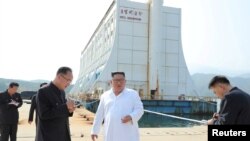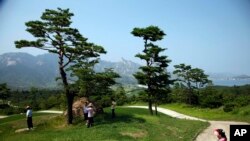Experts say Pyongyang's demolition of South Korean-owned facilities at the Mount Kumgang tourism site, once symbolic of inter-Korean cooperation, signals the regime is no longer seeking to engage with Seoul and Washington for now.
Pyongyang demolished several buildings at the golf resort at Mount Kumgang near North Korea's southeastern coast, a move that was captured in commercial satellite photos taken by Planet Labs between April 1 and 11. VOA's Korean Service reviewed and authenticated the images.
Another Mount Kumgang attraction, the Hotel Haegumgang, a seven-story floating hotel, was also dismantled, as indicated by satellite images taken by Planet Labs last week. VOA's Korean Service reviewed and authenticated these images as well.
"The dismantlement of the Haegumgang Hotel and demolition of the golf course (has) been constantly ongoing," said South Korea's Unification Ministry on Tuesday.
Robert Manning, a senior fellow at the Atlantic Council, said that North Korean leader "Kim Jong Un is making an emphatic statement: The inter-Korean cooperation is over, at least for the foreseeable future."
Joseph DeTrani, who served as the special envoy for six-party denuclearization talks with North Korea during the George W. Bush administration, said, "With the demolition of the golf course and the hotel, (the North Koreans) are saying to the (South Koreans) and the United States, 'We don't want to do business with you.'"
DeTrani continued, "It's a very clear statement they're making," which is, "We're going to do (business) with Russia, and we're going to do (it) with China."
"What we see now is North Korea going its own way, and that way is aligning itself much more closely with China and Russia," he said.
North Korea is looking to boost economic and trade relations as well as security ties with Beijing and Moscow while retaining its cache of nuclear weapons and missiles, DeTrani said. This, he said, holds more appeal for Pyongyang than trying to engage with Seoul and Washington to obtain concessions and a security guarantee that would require it to denuclearize.
The North Koreans "are making it very clear they're not interested in dialogue, again, unless it's on their terms," which include sanctions relief, halting of any joint military exercises, and other concessions, said DeTrani.
On Thursday, Kwon Young-se, nominated by president-elect Yoon Suk-yeol of South Korea to head the Unification Ministry, said, "Amid a situation that North Korea has nuclear weapons and is continuing to make advancements in its nuclear development, I think the normalization of inter-Korean relations is difficult."
The 'Diamond Mountain'
Mount Kumgang, also known as Diamond Mountain, is located in Kangwon province of North Korea. Revered by all Koreans for its beauty, the area has attracted artists, writers, poets and religious figures for centuries. The inter-Korean tourism project began in 1998.
In 1989, the South Korean conglomerate Hyundai Group signed an agreement with North Korea that gave Hyundai exclusive rights to manage and operate Mount Kumgang tourism, including bringing in South Korean tourists via cruise ships it operated, constructing resorts and operating attractions, until 2018.
Although it is unclear how much the site earned for North Korea under the agreement, Hyundai was to pay Pyongyang a fee of $100 a day for each South Korean tourist visiting the site, according to The New York Times.
Hyundai was also to pay North Korea $942 million in royalties to operate the tours through 2005, when the deal was to be renegotiated. Hyundai estimated that 500,000 people per year would visit the site for at least three days each during the length of contract, according to the Times. While the tours operated from 1998 to 2008, nearly 2 million people visited the site, according to the website Statista.
South Korea suspended the tours in 2008 after a North Korean guard fatally shot a South Korean tourist. The tours remain closed because of U.N. sanctions.
In September 2017, days after North Korea conducted its sixth nuclear test, the U.N. Security Council imposed Resolution 2375, which prohibited all joint ventures with the regime in order to deprive it of funding for its weapons programs.
At their February 2019 summit in Hanoi, Vietnam, North Korean leader Kim asked former U.S. President Donald Trump to lift sanctions in exchange for partial denuclearization. That broke down when Trump turned down Kim's demand.
The destruction of Mount Kumgang facilities suggests North Korea has given up hope for sanctions relief, said Ken Gause, director of the Adversary Analytics Program at CNA.
"The Biden administration has given no indication it wants to provide sanctions relief," Gause said. "There's nothing to give (North Korea) any hope for sanctions relief, meaning no economic engagement or any kinds of economic incentives that can be granted from the United States or South Korea."
In June 2020, North Korea blew up the South Korean-built joint liaison office in the demilitarized zone dividing the two Koreas.
Harry Kazianis, president and CEO of the developing think tank Rogue States Project, said the developments leading up to the demolition of Mount Kumgang facilities signals Pyongyang is ending its ties with the outgoing government of President Moon Jae-in.
Kazianis said, "(It's) a shame as President Moon staked his entire presidency on inter-Korean dialogue and was doing all he could to foster better relations."
At the same time, Pyongyang is trying to establish its own terms with the incoming government of President-elect Yoon, experts say.
Gause said, "North Korea knows that the (incoming) Yoon administration is not going to be forward leaning in trying to engage North Korea." He added that North Korea is trying to make sure "they're the ones that are setting the terms" for any possible interactions.
Soo Kim, a former CIA analyst and current policy analyst at the Rand Corporation, said, "Kim may want to set the tone and pace of inter-Korean relations before the Yoon administration comes into office to make sure he has control of their interactions."
"The key thing for the U.S. and South Korea is to respond in a way that clearly delineates the limits of their tolerance," she continued. "Kim has not yet felt the costs of his belligerence and provocative behavior, so he remains undeterred. If anything, he has been rewarded and validated in the effectiveness of his strategy. The greatest challenge for the U.S. and South Korea is to prove Kim otherwise."
















